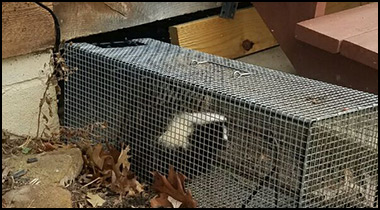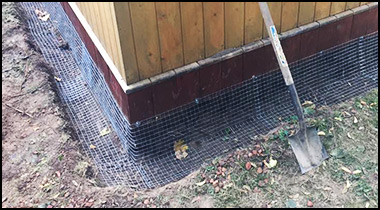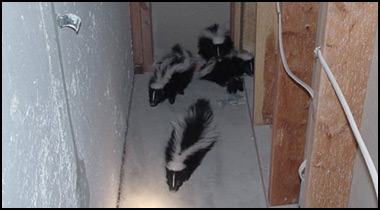Montgomery Skunk Removal Resources
Skunk Rehabber - Wild Mammal Care of Alabama: 205-403-7394
Free Montgomery County Animal Services: (334) 409-0622
Humane Wildlife Trappers of Montgomery: 334-239-2790
If you need skunk control in Montgomery, you have a few options. First, you can attempt to solve the skunk problem yourself by reading our do-it-yourself guide. If you need outside help, you can also call Montgomery County Animal Services to see if they have any free resources or help for you - however, they primarily deal with dog and cat concerns. You can also call a local Montgomery wildlife rehabber, as they are typically a great resource for advice that is in the best welfare of the animal. If as a last resort you must hire a professional company, we recommend Humane Wildlife Trappers of Montgomery at 334-239-2790. To learn more about them or check their skunk removal prices, visit montgomerypestanimal.com.

Montgomery Skunk Trapping and Removal

Preventative Repairs & Exclusion

Montgomery Skunk Removal From Structures
In many cases, preventative measures can solve your Montgomery skunk problem - keep garbage secured, pet food indoors, and most of all when it comes to skunks, secure the perimeter of your shed, porch, deck, or house with a barrier - lattice or steel mesh is good, and it keeps Alabama skunks from going under the structure. If trapping and removal of the skunk is the only option you have, please do so with the help of a local agency or professional company who knows how to do it humanely and legally. Browse the resources of this site for more educational information.
Frequently Asked Questions:
Prevention: How to Keep Skunks Away
What to do with a skunk after I catch it?
Is it legal for me to trap a skunk?
How to remove skunk odor
Is a skunk active during the daytime rabid?
What does skunk feces look like?
Montgomery Skunk Control Information: Are skunks dangerous to cats, dogs, or other pets?
Everyone knows that Skunks have an awful smelling spray that is their primary means of defense, but they can harbor more dangers than just that horrific stench. There are many reports each year of cases rabies running through skunk populations. Skunks are the second most rabies infected hosts proceeded only by bats in the U.S. All pet owners should really be sure their animals are up-to-date on their vaccinations in the off chance of coming across a rabid skunk. Rabies virus works its way it's slowly from a bite wound to the brain and it is 100percent fatal to your pet.
Skunks can also carry a myriad of unwanted parasites as they venture across your yard in search of food. While skunks are not likely to be carry fleas like Opossums, squirrels, or raccoons are prone to do, they can drop flea eggs around your yard. Skunks can also become infected with a gruesome type of round worm (Baylisascaris columnaris) that can seriously harm your pet if it happens to ingest an infected skunk's feces. This is not something you want your pet to be eating. This type of round worm can cause serious brain damage.
Other dangers posed by skunks to your pets are the obvious. They will defend themselves if frightened, and can bite if attacked. Any bite can get infected and cause serious problems for your pet. A Skunk's long sharp claws can also pose a danger too pets, especially since skunks are easier for your pet to catch than most other wild animals. If your pet is not deterred by the skunk's stench, it will most likely get bit if it persists in aggravating the skunk. It is best to take your wounded pet to a veterinarian immediately. Although it might be fine, it is important that the wound be properly cleaned; your vet might even suggest your pet start a run of antibiotics.
The best way to keep your pets safe is to monitor their "free" time outside, and watch for signs of skunks in your yard. There are many suggestions on how to keep skunks out, but the best by far, is buried fencing. Contact your local animal control service for more helpful tips
Remember, for free services you can try 205-403-7394 or (334) 409-0622, but if you need to pay for professional help, check the prices at the montgomerypestanimal.com website. Or follow our do-it-yourself guide!

